Dental Average Salaries in Galway 2024
How much money does a person working in Dental make in Galway?

LOW
20,400
EUR AVERAGE
59,900
EUR HIGH
114,000
EUR
A person working in Dental in Galway typically earns around 59,900 EUR. Salaries range from 20,400 EUR (lowest average) to 114,000 EUR (highest average, actual maximum salary is higher).
Salary Variance
The provided figure represents the median compensation that encompasses housing, transportation, and other perks. The salaries within the Dental domain in Galway exhibit significant discrepancies across various professions. In case you seek information about the remuneration of a specific position, please refer to the salaries listed below for respective job titles.
Dental Jobs Pay Scale and Salaries in Galway
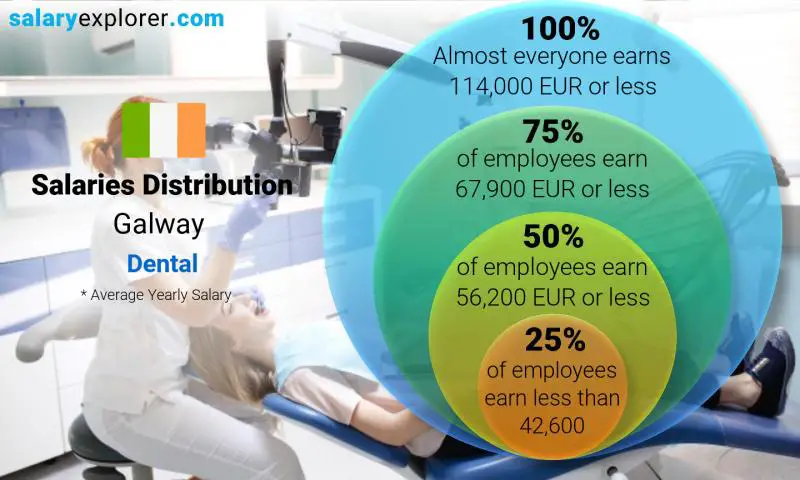
Salary Structure and Pay Scale Comparison
60,100 EUR or more
50,300 to 60,100 EUR
28,900 EUR or less
28,900 to 50,300 EUR
 20,400 EUR |
 56,200 EUR |
 114,000 EUR |
Median Salary, maximum and minimum salary, minimum wage, starting salary, and the salary range
Salary Range, Minimum Wage, and Starting Salary
Salaries in Dental in Galway range from 20,400 EUR (starting average salary) to 114,000 EUR (maximum average salary, actual maximum is higher). To clarify, the number presented is not the legally mandated minimum wage. Rather, it represents the lowest figure reported in a salary survey that involved thousands of participants and professionals from across the entire country.
Median Salary
The median income in the field of Dental is 56,200 EUR, implying that half of the workforce in Galway earns less than this figure, and the other half earns more. It represents the central value of salaries. As a rule of thumb, you would prefer to be part of the group earning above the median wage, situated on the right-hand side of the salary distribution chart.
Percentiles and Salary Scale
Two values that are highly correlated with the median are the 25th and 75th percentiles. By examining the salary distribution diagram, it is possible to determine that 25% of individuals employed in Dental in Galway earn less than 42,600 EUR, while 75% of them earn more. Additionally, the diagram reveals that 75% of individuals earn less than 67,900 EUR, while 25% earn more than that.
Pay Scale Structure
Data was regrouped into brackets to provide a better understanding of what salaries can be expected. This approach was deemed more accurate than relying solely on the average salary, as it offers greater insights into the distribution of salaries in the field of Dental in Galway. The analysis revealed that roughly 65% of all reported salaries fell within the range of 28,900 EUR to 50,300 EUR. Approximately 20% of salaries were below the 28,900 EUR mark, while 10% ranged from 50,300 EUR to 60,100 EUR. Only 5% of individuals earned a gross salary of 60,100 EUR or higher.
Salary Comparison by Years of Experience
How does a person's salary progress over time?
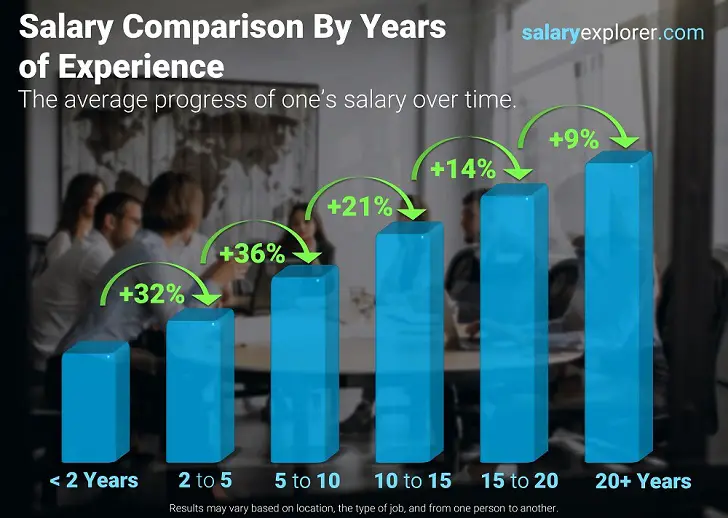
The experience level is the most important factor in determining the salary. Naturally, the more years of experience the higher the wage.
Generally speaking, employees in Dental in Galway having experience from two to five years earn on average 32% more than freshers and juniors across all industries and disciplines.
Professionals with experience of more than five years tend to earn on average 36% more than those with five years or less of work experience.
As you hit the ten years mark, the salary increases by 21% and an additional 14% for those who have crossed the 15 years mark.
Those figures are presented as guidelines only. The numbers become more significant if you consider one job title at a time.
Salary and Compensation Comparison By Gender / Dental / Galway
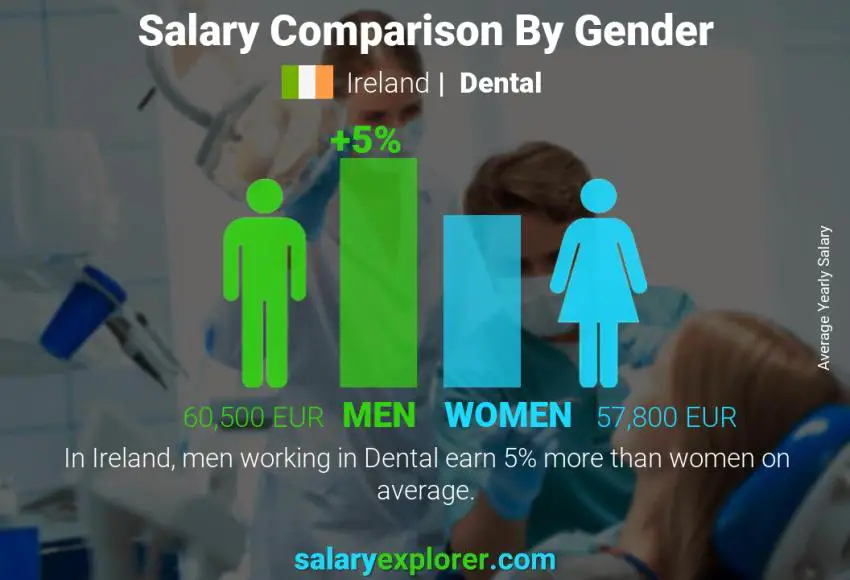
Though gender should not have an effect on pay, in reality, it does. So who gets paid more: men or women? In the field of Dental in Ireland, the average difference between the salary of male and female employees is 5%.
| Male | 60,500 EUR | |
| Female | -4% | 57,800 EUR |
Salary Comparison By Gender in Ireland for all Careers

Average Annual Salary Increment Percentage / Dental / Galway
How much are annual salary increments in Galway for individuals working in Dental? How often do employees get salary raises?
Professionals working in Dental in Ireland are likely to observe a salary increase of approximately % every months. The national average annual increment for all professions combined is 9% granted to employees every 16 months.
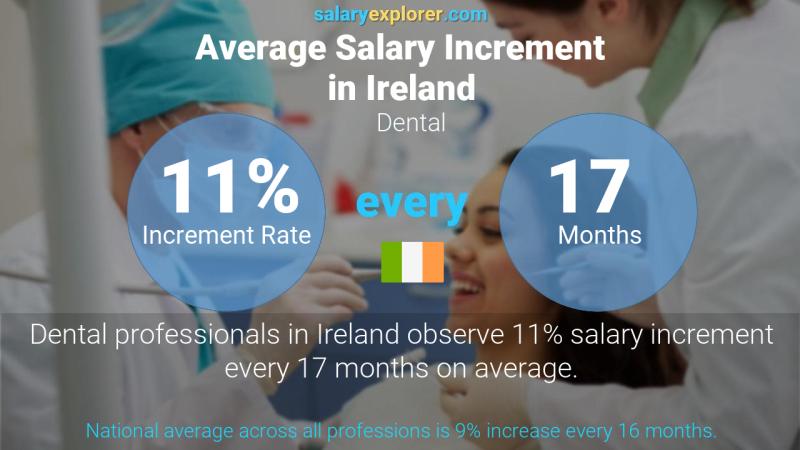
Ireland / All Professions
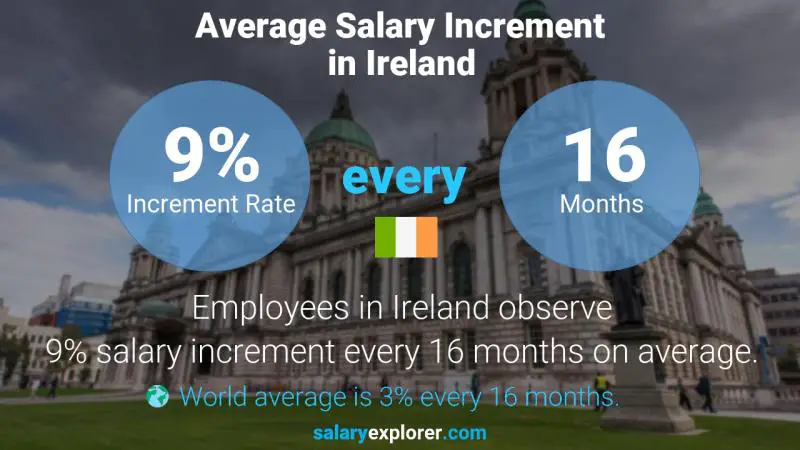
The term Annual Salary Increase usually refers to the increase in 12 calendar month period, but because it is rare that people get their salaries reviewed exactly on the one-year mark, it is more meaningful to know the frequency and the rate at the time of the increase.
How to calculate the salary increment percentage?
The annual salary Increase in a calendar year (12 months) can be easily calculated as follows: Annual Salary Increase = Increase Rate x 12 / Increase Frequency
Worldwide Salary Raises: All Countries and All Jobs
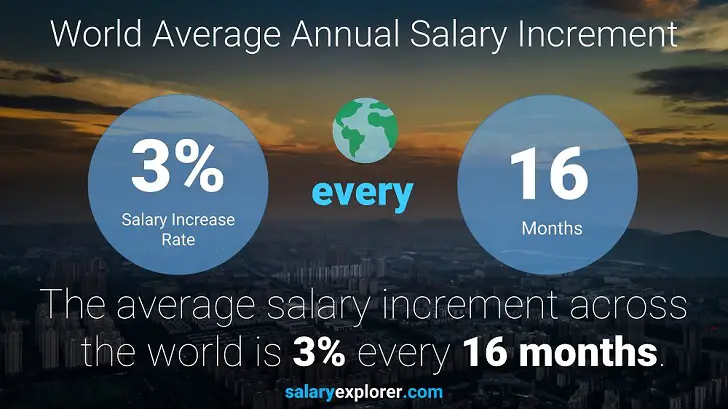
Salary Packages and Schemes
Not all compensation increases are reflected directly in the salary. Some companies offer upgraded packages to their staff instead of cash money. The figures displayed here account only for direct increments to the base salary.
Bonus and Incentive Rates / Dental / Ireland
How much and how often are bonuses being awarded? Share This Chart Tweet Get Chart Linkhttp://www.salaryexplorer.com/charts/ireland/health-and-medical/dental/annual-salary-bonus-rate-ireland-dental.jpg
Share This Chart Tweet Get Chart Linkhttp://www.salaryexplorer.com/charts/ireland/health-and-medical/dental/annual-salary-bonus-rate-ireland-dental.jpg
100% of surveyed staff in Dental reported that they haven't received any bonuses or incentives in the previous year while % said that they received at least one form of monetary bonus.
Those who got bonuses reported rates ranging from % to % of their annual salary.
| Received Bonus | % | |
| No Bonus | 100% |
Types of Bonuses Considered
Individual Performance-Based BonusesThe most standard form of bonus, where the employee is awarded based on their exceptional performance.
Company Performance BonusesOccasionally, some companies like to celebrate excess earnings and profits with their staff collectively in the form of bonuses that are granted to everyone. The amount of the bonus will probably be different from person to person depending on their role within the organization.
Goal-Based BonusesGranted upon achieving an important goal or milestone.
Holiday / End of Year BonusesThese types of bonuses are given without a reason and usually resemble an appreciation token.
Bonuses Are Not Commissions!
People tend to confuse bonuses with commissions. A commission is a prefixed rate at which someone gets paid for items sold or deals completed while a bonus is in most cases arbitrary and unplanned.
What makes a position worthy of good bonuses and a high salary?
The main two types of jobs | |
| Revenue Generators | Supporting Cast |
Employees that are directly involved in generating revenue or profit for the organization. Their field of expertise usually matches the type of business. | Employees that support and facilitate the work of revenue generators. Their expertise is usually different from that of the core business operations. |
Example: | Example: |
Revenue generators usually get more and higher bonuses, higher salaries, and more frequent salary increments. The reason is quite simple: it is easier to quantify your value to the company in monetary terms when you participate in revenue generation.
Bonus Comparison by Seniority Level
Top management personnel and senior employees naturally exhibit higher bonus rates and frequencies than juniors. This is very predictable due to the inherent responsibilities of being higher in the hierarchy. People in top positions can easily get double or triple bonus rates than employees down the pyramid.
Hourly Average Wage / Dental / Galway
 29 EUR per hour
29 EUR per hourThe average hourly wage (pay per hour) in Dental in Galway is 29 EUR.This is the rate they get paid for every worked hour.
About The Hourly Pay Rate
The hourly wage is the salary paid in one worked hour. Usually, jobs are classified into two categories: salaried jobs and hourly jobs. Salaried jobs pay a fixed amount regardless of the hours worked. Hourly jobs pay per worked hour. To convert salary into hourly wage the above formula is used (assuming 5 working days in a week and 8 working hours per day which is the standard for most jobs). The hourly wage calculation may differ slightly depending on the worked hours per week and the annual vacation allowance. The figures mentioned above are good approximations and are considered to be the standard. One major difference between salaried employees and hourly paid employees is overtime eligibility. Salaried employees are usually exempt from overtime as opposed to hourly paid staff.
What is the minimum hourly rate of pay?
The minimum pay rate per hour for people working in Dental in Galway is 10 EUR. This is the minimum as per the gathered data in the salary survey not the minimum hourly rate mandated by law.
Salary Comparison By City
| City | Average Salary |
| Cork | 66,200 EUR |
| Dublin | 69,300 EUR |
| Galway | 59,900 EUR |
| Limerick | 63,800 EUR |
| Waterford | 56,900 EUR |
Government vs Private Sector Salary Comparison
Where can you get paid more, working in a private company or the government? The difference between the public or government sector salaries and the private sector salaries in Ireland is 5% on average across all career fields.
| Private Sector | 37,700 EUR | |
| Public Sector | +5% | 39,400 EUR |
Salary Statistics and Calculation Guide
What is considered to be a good and competitive salary in Dental in Galway?
A good and competitive compensation would range anywhere between 56,200 EUR and 67,900 EUR. This is a very rough estimate. Experience and education play a very huge part in the final earnings.
Gross Salary (before tax) and Net Salary (after tax)
All salary and compensation figures displayed here are gross salary figures, that is the salary before tax deductions. Because taxes may differ across sectors and locations, it is difficult to accurately calculate the net salary after tax for every career.
Base / Basic Salary
The base salary for jobs in Dental in Galway ranges from 20,400 EUR to 42,600 EUR. The base salary depends on many factors including experience and education. It is not easy to provide a figure with very little information, so take this range with a grain of salt.
What is the difference between the median and the average salary?
Both are indicators. If your salary is higher than both the average and the median then you are doing very well. If your salary is lower than both, then many people earn more than you and there is plenty of room for improvement. If your wage is between the average and the median, then things can be a bit complicated. We wrote a guide to explain all about the different scenarios. How to compare your salary



